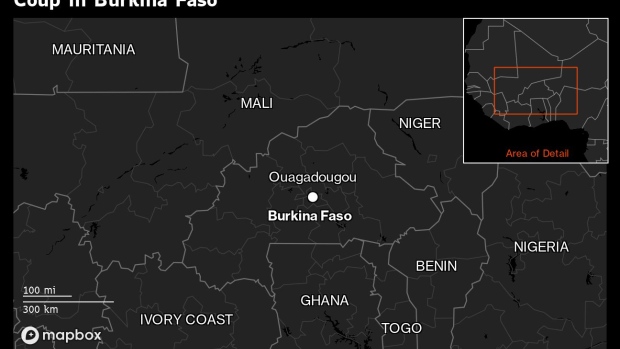Jan 26, 2022
Burkina Faso Coup Fallout to Reverberate Across West Africa
, Bloomberg News

(Bloomberg) --
A coup in Burkina Faso will reverberate across West African economies and heighten concerns about growing instability in neighboring states.
Soldiers toppled President Roch Marc Christian Kabore on Monday, accusing him of failing to tackle an Islamist insurgency that’s spreading in the region. The U.S. and United Nations condemned the takeover, while the Economic Community of West African States is preparing a summit to discuss its response to Kabore’s ouster.
The regional economic bloc, known as Ecowas, now has to decide whether to impose sanctions on Burkina Faso, as it did on Mali and Guinea following coups there last year. The U.S. signaled it may withdraw aid to the country, one of the world’s poorest despite its status as Africa’s fourth-biggest gold producer.
The repercussions of any possible sanctions -- which have done little to persuade other juntas in the region to relinquish power -- would be felt across Burkina Faso’s borders. Ivory Coast, which serves as a transit route for the bulk of its landlocked neighbors’ imports and has already seen its trade with Mali disrupted, would likely be hardest hit. Commercial links with Niger, Benin, Togo and Ghana could also be adversely impacted.
Gold miners in the country including Endeavour Mining Plc and Iamgold Corp. have said their operations are unaffected by the events in the capital, Ouagadougou.
A larger concern for Burkina Faso’s southern neighbors is security, with Islamists who’ve been waging an insurgency in the Sahel region since they seized part of northern Mali in early 2012 looking to expand their reach.
Despite Burkina Faso’s military citing the government’s failure to suppress the insurgency as justification for taking power, the army may find itself even more starved of resources, especially if sanctions are imposed, said Hassane Kone, a researcher who covers the Sahel for the Pretoria-based Institute for Security Studies. That would undermine its ability to keep the militants in check and weaken one of its neighbors’ key buffers against them.
Militants affiliated with both al-Qaeda and Islamic State began making inroads into Burkina Faso after the ouster of President Blaise Compaore in 2014, bolstering a brewing homegrown insurgency with attacks on civilians, soldiers and mining operations. Niger and Chad have also been targeted.
The violence spread to coastal states in recent months. Benin reported last month that two of its soldiers were killed and several injured in an attack on a base in the north of the country -- with al-Qaeda claiming responsibility. Ivory Coast, the world’s biggest cocoa grower, has reported an upsurge in insurgent activity.
The succession of recent putsches in Africa -- there have been five since August -- also bodes ill for other civilian leaders with a shaky hold on power.
“Considering Ecowas’ recent failures to deter coups, what happened in Mali and Burkina Faso may inspire other officers in the region,” said Ibrahim Yahaya Ibrahim, senior Sahel analyst at the International Crisis Group.
French Troops
Kabore’s removal deprives French President Emmanuel Macron of another regional ally who backed the deployment of about 5,000 French troops to help nations including Burkina Faso, Mali and Niger combat the Islamist militants. It also presents opportunities for geopolitical rivals.
The French deployment has become increasingly unpopular in the region for failing to quell the insurgency, and Macron announced plans last year to draw down the forces. The proposed withdrawal led Malian Prime Minister Choguel Maiga in September to accuse France of abandoning his country and signal that the junta would look elsewhere for help to combat the insurgency.
Three months later, hundreds of Russian mercenaries belonging to the Wagner Group began deploying to Mali, according to French and U.S. security officials. Malian authorities denied they were Wagner forces and said the Russian personnel are part of a contingent of military trainers.
The French may have to rethink their strategy and relations with Burkina Faso’s forces, and revise how they conduct their operations, said Marc-Andre Boisvert, a researcher at Centre FrancoPaix who studies coups in the region.
“The real problem is security,” he said by phone. “This just adds extra oil on a fire that has already had too much fuel.”
©2022 Bloomberg L.P.


